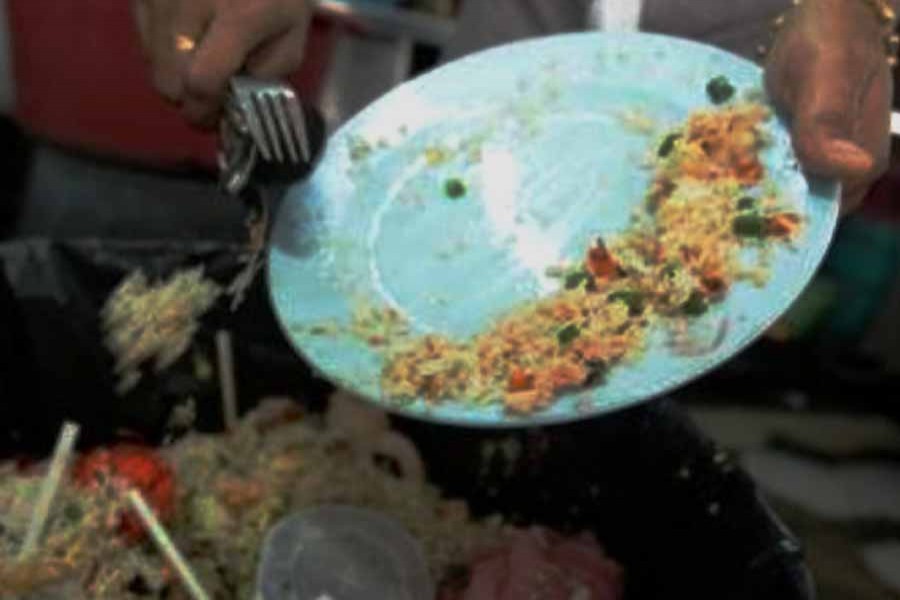
Published :
Updated :

Around 50 per cent of youths visit restaurants two to four times a month, spending Tk 3,000 each, indicating high food and water consumption and higher waste, a study showed.
Most food waste takes place at wedding ceremonies followed by restaurants, it said.
About 88 per cent of the respondents claimed to have drunk mineral water.
Claiming themselves as foodies, those polled also mentioned a lack of proper places to hang out forces them to choose a restaurant as a meeting place.
They have to purchase unnecessary food there which is often wasted or which leads to overeating. About 45 per cent said they love traditional Bangla food.
Over 44 per cent of youths love fast food, 27 per cent Chinese, 14 per cent Indian and 7.0 per cent Thai food.
But experts said SDG goal 12 (sustainable consumption and production) is of the central goals of SDG that promotes circular economy model to ensure environmental, social and economic sustainability.
They suggested consuming food as per body requirement, reducing food waste at retail and consumer levels, cutting food losses along production and supply chains, and controlling plastic use.
They also recognised the need for making proper use of food through distribution among the poor.
The experts made the suggestions at a study-sharing programme on 'Food Consumption Behaviour in Dhaka' at a city hotel hosted by ActionAid Bangladesh in collaboration with Macomm.
Additional secretary of environment and forest ministry SM Munjurul Hannan Khan, World Food Programme Bangladesh country director Richard Ragan and noted chef Tony Khan attended the event.
ActionAid Bangladesh country director Farah Kabir moderated the session.
A total of 1,500 respondents from seven areas of Dhaka city were interviewed for the food consumption survey from July 23 and September 04.
Of them, 56 per cent or 843 were male.
The respondents were divided in two age groups: 15-24 years and 25-30 plus years.
An estimated 27 per cent of youths visit five to seven times a month, 11 per cent visit eight to 10 times and 10 per cent more than 10 times.
About 59 per cent spend approximately Tk 3,000 at restaurants per month, 26 per cent Tk 3,000-4,000, about 9.0 per cent Tk 5,000-6,000 and 6.0 per cent more than Tk 7,000 a month.
About 52 per cent said food waste occurs at wedding ceremonies and 30 per cent said it happens at restaurants.
Among the 25-30 plus age group, 48 per cent spend approximately Tk 3,000 at restaurants, 27 per cent Tk 3,000-4,000, 17 per cent Tk 5,000-7,000 and 8.0 per cent more than Tk 7,000.
About 68 per cent said they have suffered for overeating, 35 per cent from gastric or burn, 21 per cent for food poisoning, 19 per cent from obesity and 13 per cent from high blood pressure.
Chef Mr Khan said food poisoning has become an alarming issue due to packaging, canned food and lack of proper preservation in standard temperature.
Mr Hannan said food and culture is interlinked. The value of not wasting food is fading away gradually among the young generation.
But people are most reluctant about the packaging and plastic use in food supply chain, he added.
The government will enact law to restrict production of single use plastic.
He called for a social movement for banning plastic use and overall behavioural change in food consumption.
msshova@gmail.com


 For all latest news, follow The Financial Express Google News channel.
For all latest news, follow The Financial Express Google News channel.